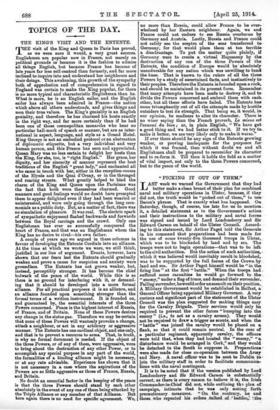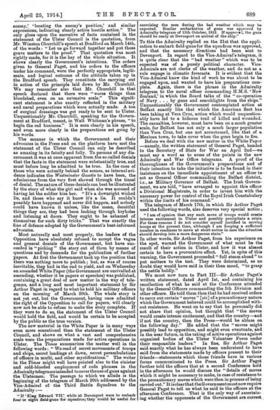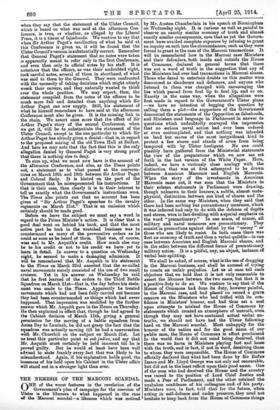" PICKING IT OUT OF THEM."
T AST week we warned the Government that they had _L./ better make a clean breast of their plan for combined naval and military operations in Ulster, because, if they did not, the truth would be "picked out of them," to use Bacon's phrase. That is exactly what has happened. On Saturday, though, of course, too late for, us to mention it, a detailed statement as to the Government's action and their instructions to the military and naval forces was signed and issued by Lord Londonderry and Sir Edward Carson on behalf of the Ulster Council. Accord- ing to this statement, Sir Arthur Paget told the Generals in his command that preparations had been made for the use of some twenty-five thousand troops in Ulster, which was to be blockaded by land and by sea. The troops were not to begin operations—that was to be left to the civil authorities_ But the action of such authorities, • which it was believed would inevitably result in bloodshed, was to be supported. by the full forces of the Crown by land and sea. Sir Arthur Paget himself would be "in the firing line " at the first " battle." When the troops had suffered some casualties he would go forward to the " enemy," under a flag of truce, and demand their surrender. Failing surrender, he wouldorder an assault on their position. A Military Government would be established in Belfast, a General Officer being appointed Military Governor. A very curious and significant part of the statement of the Ulster Council was the plan suggested for making things easy for the Cavalry Brigade. Their services would only be required to prevent the other forces " bumping into the enemy " (i.e., to act as a cavalry screen). They would not be required to draw a trigger as scouts, and when the " battle ' was joined the cavalry would be placed on a. flank, so that it could remain neutral. In the case of a particular regiment, apparently cavalry, the officers were told that, when they had located the "enemy," "a disturbance would be arranged in Cork," and they would be detached to the South to suppress it. Preparations were also made for close co-operation between the Army and Navy. A naval officer was to be sent to Dublin to join the military staff in order to facilitate communica- tions with the naval contingent.
It is to ba noted that if the version published by Lord Londonderry and Sir Edward. Carson is substantially correct, as there is every reason to believe it is, the Irish Commander-in-Chief did not, while outlining th3 plan of campaign, intimate that ho was only setting forth precautionary measures. " On the contrary, he and those who repeated his orders .talked of battles," '.the enemy,' locating the enemy's position,' and similar expressions, indicating clearly active hostile action." The only gloss -upon the narrative of facts contained in the statement of the Ulster Council is the quotation, from Mr. Winston Churchill's speech at Bradford on March 14th, of the words : " Let us go forward together and put these grave matters to the proof." That quotation was most rightly made, for it is the key of the whole situation. It shows clearly the Government's intentions. The orders given to General Paget, and his orders to the officers under his command, were the perfectly appropriate, legiti- mate, and logical outcome of the attitude taken up in the Bradford speech. They constitute the carrying out in action of the principle laid down by Mr. Churchill. We may remember also that Mr. Churchill in that speech declared that there were " worse things than bloodshed, even on an extensive scale." This signifi- cant statement is also exactly reflected in the military and naval preparations which were actually made. A ton of surgical dressings was got ready to be sent to Ulster. Unquestionably Mr. Churchill, speaking for the Govern- ment at Bradford, meant, in Walt Whitman's phrase, " to begin the red business." It is seen clearly in his speech, and even more clearly in the preparations set going by his words.
The manner in which the Government and their advocates in the Press and on the platform have met the statement of the Ulster Council can only be described as amazing in its fatuity and folly. To persons of any dis- cernment it was at once apparent from the so-called denials that the facts in the statement were substantially true, and must before long be admitted to be true. In the case of those who were actually behind the scenes, as internal evi- dence indicates the Westminster Gazette to have been, the admissions from the very first showed through the tinsel of denial. The nature of these denials can best be illustrated by the story of what the girl said when she was accused of having let the soldier kiss her. "It's a downright wicked lie, and those who say it know it's a lie. It couldn't possibly have happened and never did happen, and nobody could have known it unless, like the mean, deceitful things they are, they had been looking through keyholes and listening at doors. They ought to be ashamed of themselves for such dirty tricks." That was exactly the tine of defence adopted by the Government's best-informed advocates.
Most naturally and most properly, the leaders of the Opposition have absolutely refused to accept the vague and general denials of the Government, but have suc- ceeded in " picking " the story out of them by means of questions and by demands for the publication of further papers. At first the Government took up the position that there was nothing more to publish ; but, as was of course inevitable, they had in the end to yield, and on Wednesday an amended White Paper (the Government are unrivalled at amending, whether it be papers or speeches) was published, containing a great deal of new matter in the way of tele- grams, and a long and most important statement by Sir Arthur Paget in regard to what he told his military officers on the morning of March 20th. The whole story is not yet out, but the Government, having once admitted the right of the Opposition to call for papers, will clearly now not be able to refuse to make the story complete. If they were to do so, the statement of the Ulster Council would hold the field, and would be certain to be accepted by the public as the true version.
The new material in the White Paper is in many ways even more sensational than the statement of the -Ulster Council, and shows on what a vast and comprehensive scale were the preparations made for active operations in Ulster. The Times summarizes the matter well in the following words : " We read of secret movements of troops and ships, secret landings at dawn, secret perambulations of officers in mufti, and other mystifications." The writer in. the Times might well have pointed also to the sinister and cold-blooded employment of code phrases in the Admimlty tekgrams intended to cover the use of guns against the Ulstermen. The passage to which we allude is the beginning of the telegram of March 20th addressed by the Vice-Admiral of the Third Battle Squadron to the Admiralty :-
If 'King Edward while at Devonport were to embark
foui or eight field-guns -for seuaCron,-they would be useful for
exercising the men during the bad weather which may be expected. Similar embarkation of guns was approved by Admiralty telegram of 11th October, 1912. If approval, the guns should be ready at Davenport on arrival of the ship."
To this the Admiralty replied on the 21st that the appli- cation to embark field-guns for the squadron was approved, and that the necessary directions had been sent to Devonport. In regard to the Vice-Admiral's telegram, it is quite clear that the "bad weather" which was to be expected was of a purely political character. Vice- Admirals are not clerks of the weather, and do not as a rule engage in climatic forecasts. It is evident that the Vice-Admiral knew the kind of work he was about to be engaged upon, and wanted to have his preparations com- plete. Again, there is the phrase in the Admiralty telegram to the naval officer commanding H.M.S. ' New Zealand,' in which the Board talks of the " co-operation of Navy . . . by guns and searchlights from the ships." Unquestionably the Government contemplated action at Belfast exactly like that which the American fleet has been taking at Vera Cruz, action which would unquestion- ably have led to a hideous trail of killed and wounded. The casualties, however, must have been on a much greater scale, for Belfast has not only a much larger population than Vera Cruz, but one not accustomed, like that of a Mexican town, to take cover when the guns begin to fire.
Before we deal with the new matter in the White Paper —namely, the written statement of General Paget, handed to the Secretary of State for War on April 2nd—we must say a word as to some of the points in the new Admiralty and War Office telegrams. A proof of the thoroughness of the Government's preparations and of their intention to take the initiative is to be found in their insistence on the immediate appointment of an officer to act as General Officer commanding the Belfast district, i.e., as Military Governor of Belfast. The Irish Govern- ment, we are told, "have arranged to appoint this officer a Divisional Magistrate, in order to invest him with the necessary power for control of the Royal Irish Constabulary within the limits of his command."
The telegram of March 17th, in which Sir Arthur Paget used the following words, also deserves very special notice
"I am of opinion that any such move of troops would create intense excitement in Ulster and possibly precipitate a crisis. For these reasons I do not consider myself justified in moving troops at the present time, although I am keeping a sufficient number in readiness to move at short notice in case the situation should develop into a more dangerous state."
In other words, Sir Arthur Paget, from his experience on the spot, warned the Government of what must be the result of their action in Ulster, and how it was almost certain to have a provocative effect. Yet, in spite of this warning, the Government proceeded " full steam ahead" to put matters to the test. They were determined, as no doubt they would have said in their then mood, "to grasp the nettle boldly."
We must now turn to Part III—Sir Arthur Pagera written statement, dated April 1st, and containing his recollection of what he said at the Conference attended by the General Officers commanding the 5th Division and other officers. He told them then that he had received orders to carry out certain " moves " [sic] of a precautionary nature which the Government believed could be accomplished with- out resistance. He went on to say that he personally did not share that opinion, but thought that " the moves would create intense excitement, and that the country—and if not the country, then the Press—would be ablaze on the following day." He added that the " moves might possibly lead to opposition, and might even eventuate, and in the near future, in the taking of active operations against organized bodies of the Ulster Volunteer Force under their responsible leaders." In fine, Sir Arthur Paget said exactly what he has always been understood to have said from the statements made by officers present to their friends—statements which those friends have is various forms communicated to the Press. Sir Arthur Paget further told the officers that at a second Conference held in the afternoon be would discuss the "details of moves which it might be necessary to make, incase of resistance to
the precautionary moves which were then in process of being carried out." It is clear that the Government mustnow require
General Paget to tell us what he said to the officers at the afternoon Conference. That is the only way of ascertain- ing whether the opponents of the Government are correct .
when they say that the statement of the Ulster Council, which is based on what was said at the afternoon Con- ference, is true, or whether, as alleged by the Liberal Press, it is a tissue of falsehoods. We venture to say that when Sir Arthur Paget's recollection of what he said at this Conference is given us, it will be found that the Ulster Council's version is substantially correct. Remember that General Paget's statement that no notes were taken is apparently meant to refer only to the first Conference, and even then only to official notes by his staff. It is notorious that the officers, as was their undoubted right, took careful notes, several of them in shorthand, of what was said to them by the General. They were confronted with the necessity of taking decisions which might utterly wreck their careers, and they naturally wanted to think over the whole position. We may expect, then, the statement compiled from the notes of the officers to be much more full and detailed than anything which Sir Arthur Paget can now supply. Still, his statement of what he himself remembers to have said at the afternoon Conference must also be given. It is the missing link in the chain. We assert once more that the effect of Sir Arthur Paget's story of the second Conference, when we get it will be to substantiate the statement of the Ulster Council, except in the one particular to which Sir Arthur Paget has already given a denial—that is, in regard to the proposed seizing of the old Town Hall at Belfast. And here we may note that the fact that this is the only allegation denied by General Paget is very strong proof that there is nothing else to deny.
To sum up, what we must now have is the account of the afternoon Conference, and also, as the Times points out, a statement as to what passed at the conversa- tions on March 18th and 19th between Sir Arthur Paget and Colonel Seely. It is hinted on the part of the Government that be misrepresented his instructions. If that is their case, then clearly it is to their interest to tell us exactly what the Government's instructions were. The Times also points out that no account has been given of " Sir Arthur Paget's speeches to the cavalry regiments on March 21st." That is an omission which certainly should be made good.
Before we leave the subject we must say a word. in regard to the Prime Minister's action. It is clear that a good deal went on behind his back, and that the most active part he took in the wretched business was to countermand as many of the provocative orders as be could as soon as he heard of them. That was, of course, wise and to Mr. Asquith's credit. How much else may be to his credit or not to his credit we have yet to learn in detail In answer to a question on Wednesday night, he seemed to make a damaging admission. It will be remembered that Mr. Asquith in his statement to the Times on March 23rd asserted that the so-called naval movements merely consisted of the use of two small cruisers. Yet in his answer on Wednesday he said that he first learned of the orders to the Third Battle Squadron on March 21st—that is, the day before his state- ment was made to the Times. Apparently he treated movements which had not been fully carried out because they had been countermanded as things which had never happened. That impression was modified by the further answer which Mr. Asquith gave in the House on Thursday. He then explained in effect that, though be had agreed to the Cabinet decision of March 11th, giving a general permission for the moving of a battle squadron from Aroaa Bay to Lamlash, be did not grasp the fact that the squadron was actually moving till he had a conversation with Mr. Churchill on the subject on March 21st. Let us treat this particular point as sub judice, and say that Mr. Asquith must certainly be held innocent till he is proved guilty. But he would at least have been well advised to state frankly every fact that was likely to be misunderstood. Again, if his explanation holds good, the looseness of his hold upon his Cabinet in the Ulster affair will stand out in a stronger light than ever.




























































 Previous page
Previous page